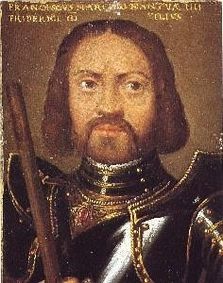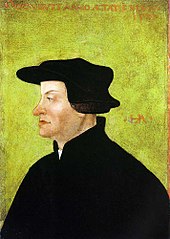1484
Portal history | Portal Biographies | Current events | Annual calendar
◄ |
14th century |
15th century
| 16th century
| ►
◄ |
1450s |
1460s |
1470s |
1480s
| 1490s
| 1500s
| 1510s
| ►
◄◄ |
◄ |
1480 |
1481 |
1482 |
1483 |
1484
| 1485
| 1486
| 1487
| 1488
| ►
|►►
| 1484 | |
|---|---|
| Johannes Reuchlin becomes a doctor of imperial law. | Gianfrancesco II Gonzaga succeeds his father Federico I Gonzaga as Margrave of Mantua . |
|
Heinrich Institoris obtained the "witch bull" from Pope Innocent VIII , which he later placed in front of his Malleus Maleficarum in order to supposedly legitimize it . |
|
| 1484 in other calendars | |
| Armenian calendar | 932/933 (turn of the year July) |
| Ethiopian calendar | 1476/77 |
| Aztec calendar | 4th tubes - Nahui Acatl (until the end of January / beginning of February: 3rd rabbit - Jei Tochtli ) |
| Buddhist calendar | 2027/28 (southern Buddhism); 2026/27 (alternative calculation according to Buddhas Parinirvana ) |
| Chinese calendar | 69th (70th) cycle
Year of the wood dragon甲辰 ( at the beginning of the year water rabbit 癸卯) |
| Chula Sakarat (Siam, Myanmar) / Dai calendar (Vietnam) | 846/847 (turn of the year April) |
| Iranian calendar | 862/863 |
| Islamic calendar | 888/889 (turn of the year January 30/31) |
| Jewish calendar | 5244/45 (September 19-20) |
| Coptic calendar | 1200/01 |
| Malayalam calendar | 659/660 |
| Seleucid era | Babylon: 1794/95 (turn of the year April)
Syria: 1795/96 (turn of the year October) |
| Spanish era | 1522 |
| Vikram Sambat (Nepalese Calendar) | 1540/41 (turn of the year April) |
Events
Politics and world events
Habsburg hereditary lands / Hungary
- March: The Hungarian King Matthias Corvinus resumes the fighting against the Habsburg hereditary lands that began in 1482 after the winter break in the campaign with three armies . While the army led by István Dávidházy besieged Bruck an der Leitha , the army commanded by Tobias von Boskowitz and Černahora set out to conquer other places in Lower Austria and secure the troops besieging Bruck. The third army, led by Péter Geréb , marches into Inner Austria to defeat the armed forces of Frederick III. to tie.
- April 19 : After Bruck and its citadel fell, Hungary begin the siege of Korneuburg , which also serves the purpose of Vienna to zernieren .
- May 11th : The army of Frederick III rushing to relieve Korneuburg . suffers a heavy defeat against the armed forces of the Hungarian king Matthias Corvinus in the battle of Leitzersdorf .
- December 3 : Korneuburg's defenders lay down their arms. This means that only Vienna and Wiener Neustadt are left by the troops of Friedrich III. held while the entire eastern part of Lower Austria is under Hungarian control.
Further events in the empire
- May 20 : 19 days after the death of his predecessor Adalbert von Sachsen, Berthold von Henneberg is elected Archbishop and Elector of Mainz and thus Arch Chancellor of the Holy Roman Empire .
- July 14th : After the death of Federico I Gonzaga , his son Gianfrancesco II Gonzaga becomes Margrave of Mantua . In the same year he entered the military service of the Duchy of Milan .
- The Löwenburg in the Siebengebirge falls to the Duchy of Berg after many previous changes of ownership .
England
The English parliament publishes the declaration Titulus Regius , in which it is justified that the English royal crown was passed on to his uncle Richard III by Edward V the previous year . has been transferred. This statement explains why the marriage between Edward IV and Elizabeth Woodville , the parents of Edward V, was invalid and that all of their children are therefore illegitimate. As a result, Richard III is now. the only legitimate successor to his late brother. However, the death of Richard's only son Edward of Middleham on April 9 at the age of eleven plunged his parents into a deep crisis as they increasingly felt the rejection of broad sections of the population that in Edward's death a divine judgment and evidence of Richard's guilt for the See elimination of his nephews Edward V and Richard of York .
Iberian Peninsula
- Castilian troops carry out raids, looting and destruction in the vicinity of the city of Malaga, which is part of the emirate of Granada . The treatment of the defeated opponents is also standardized: while the surrender conditions for conquered cities stipulate that the surviving population is free to leave the city with what they can carry, for cities that surrender without siege, the families of the made offers to the Muslim aristocracy enabling them to integrate themselves into Spanish culture and politics. They are promised that they can continue to practice their faith and that religious matters can continue to be judged according to the Sharia and the Sunna within the communities. As a result, when the troops arrive in front of Marbella, a delegation from the city offers surrender negotiations without further fighting.
Asia
- In the Malla kingdom, Ratna Malla rebelled against his brother Raya Malla, who ruled in Bhaktapur . He established his own rule in part of the kingdom with the capital Kantipur .
First documentary mentions
- Les Bois is first mentioned in a document.
science and technology
- The Latin herbal book Herbarius moguntinus or Aggregator practicus de simplicibus is printed by Peter Schöffer in Mainz.
Culture
- The late Gothic town hall in Michelstadt in the Odenwald is built.
- The College of Arms is founded in London .
- Albrecht Dürer paints the thirteen-year-old's self-portrait .
religion
Election of the Pope in 1484
Pope Sixtus IV dies in Rome on August 12th after a stroke after he learned the day before of the peace that the Italian powers allied with him concluded against his will with the Republic of Venice . On August 29, the College of Cardinals elects Giovanni Battista Cibo as his successor. He, who calls himself Innocent VIII , secures his election by bribing the cardinals the night before the decision. Papal policy subsequently largely determined Giuliano della Rovere , a nephew of his predecessor.
Innocent is best known in connection with the persecution of witches by the bull Summis desiderantes affectibus of December 5 , which Heinrich Institoris prefaces the work Malleus Maleficarum (witch's hammer), which he later wrote himself , in order to give the impression of papal approval of the work.
Orders and monasteries
- Beatrix da Silva Meneses founds the women's order of conceptionists in Toledo .
- Bishop Sixtus von Tannberg founds the monastery of the Franciscan Terziarinnen in Freising .
Historical maps and views
Born
Date of birth saved
- January 1 : Ulrich Zwingli , Swiss reformer († 1531 )
- January 17 : Georg Spalatin , advocate of Martin Luther († 1545 )
- February 21 : Joachim I , Elector of Brandenburg († 1535 )
- March 4th : Georg the Pious , Regent of Ansbach († 1543 )
- March 17 : John Sackville , English member of parliament († 1557 )
- April 23 : Julius Caesar Scaliger , real name probably Giulio Bordoni, Italian humanist († 1558 )
- April 25 : Endres Dürer , German goldsmith and silversmith († 1555 )
- May 3 : Christoph Kreß von Kressenstein , German mayor and politician († 1535 )
- May 10 : Wolfgang von Baden († 1522 )
- June 25 : Bartholomäus V. Welser , Augsburg patrician and merchant († 1561 )
- November 24th : Johann III. von Rosenberg , Grand Prior of the Order of St. John and nobleman from the House of Rosenberg († 1532 )
- November 29 : Joachim von Watt , Swiss humanist and reformer († 1551 )
- December 13 : Paul Speratus , German theologian, reformer and song writer († 1551 )
Exact date of birth unknown
- Edmund Braye, 1st Baron Braye , English nobleman († 1539 )
- Jakob Salzmann , Swiss educator and reformer († 1526 )
Born around 1484
- Charles Brandon, 1st Duke of Suffolk , English nobleman († 1545 )
- John Stewart, 2nd Duke of Albany , Scottish nobleman († 1536 )
- before or around 1484: Sebastiano Caboto , Venetian seafarer in English service († 1557 )
Died
Date of death secured
- January 31 : Elisabeth von Künsberg , abbess of the Himmelkron monastery (* 1425 )
- February 11th : Georg , Duke of Baden and Bishop of Metz (* 1433 )
- March 4 : Casimir of Poland , Polish and Lithuanian national saint (* 1458 )
- March 5 : Elisabeth of Bavaria , Electress of Saxony (* 1443 )
- April 9 : Edward of Middleham , Duke of Cornwall and Prince of Wales (* 1473 )
- May 1st : Adalbert III. , Administrator of the Archdiocese of Mainz (* 1467 )
- July 11 : Mino da Fiesole , Italian architect and sculptor (* 1430 / 31 )
- July 14 : Federico I. Gonzaga , Margrave of Mantua (* 1441 )
- July 22nd : John Maxwell, Master of Maxwell , Scottish nobleman (* around 1430 )
- August 12 : Francesco della Rovere, under the name Sixtus IV. Pope (* 1414 )
- September 9th : Hans Feer , Lucerne mayor, small councilor, bailiff, bailiff and diary delegate (* 1418 )
- November 12th : Andreas Jamometić , Croatian Archbishop, excommunicated by Sixtus IV (* 1420 )
- December 30th : Ludwig von Hanau-Lichtenberg , German nobleman and Palestinian traveler (* 1464 )
Exact date of death unknown
- before May 8th: Katherina von Baden , Countess von Werdenberg-Sargans (* 1449 )
- Thomas Lewknor , English knight and rebel








